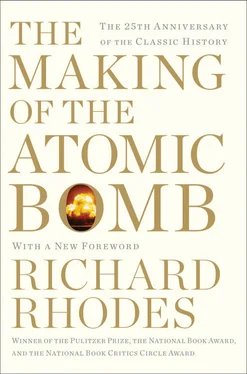It is impossible to describe the utter despair of all classes of Jews in Germany. 718The thoroughness with which they are being hounded out and stopped short in their careers is appalling. Unless help comes from the outside, there is no outlook for thousands, perhaps hundreds of thousands, except starvation or [suicide]. It is a gigantic “cold pogrom” and it is not only against Jews; Communists of course are included, but are not singled out racially; Social Democrats and Liberals generally are now or are coming under the ban, especially if they protest in the least against the Nazi movement….
Dr. Leo Szilard… proved to be the best prognosticator—he was able to foresee events better than anybody else I know. Weeks before the storm broke he began to formulate plans to provide some means of helping the scientists and scholars of Germany.
Szilard was becoming nervous about his own lack of anchorage. He had not, he wrote another friend in August, “dismissed the idea of going to India, neither has this idea grown stronger.” 719He was not opposed to America, but he would very much prefer to live in England. Although he was “rather tired,” he felt “very happy in England.” His happiness darkened to gloom as soon as he looked ahead: “It is quite probable that Germany will rearm and I do not believe that this will be stopped by intervention of other powers within the next years. Therefore it is likely to have in a few years two heavily armed antagonistic groups in Europe, and the consequence will be that we shall get war automatically, probably against the wish of either of the parties.” 720
That prepared him for that cool, humid, dull day in September when he would step off the Southampton Row curb and begin to shape the things to come.
* * *
Einstein crossed the Channel to England for the last time on September 9 and came under the flamboyant protection of a Naval Air Service commander, barrister and M.P. named Oliver Stillingfleet Locker-Lampson, who had the peculiar distinction of having been invited, while serving under the Grand Duke Nicholas of Russia, to murder Rasputin, an invitation which uncharacteristic discretion led him to decline. 721Locker-Lampson sent the distinguished physicist off the next morning to a vacation house isolated on moorlands on the east coast of England. Einstein had left Belgium at his wife’s insistence: she feared for his life. While she organized their emigration he settled in at Roughton Heath, walking the moors “talking to the goats,” he said. 722There he learned of the suicide of Paul Ehrenfest, one of his oldest and closest friends, on September 25; Ehrenfest had tried to kill his youngest son and blinded him and then killed himself.
The largest public event of the rescue was a mass meeting in Royal Albert Hall, the great circular auditorium in London below Kensington Gardens. Einstein was the featured speaker and therefore all the hall’s ten thousand seats were filled and the aisles crowded. Ernest Rutherford came down from Cambridge to chair the event. Afterward Einstein packed his bags and left for America, joining his wife on the Westernland when it stopped at Southampton on its way from Antwerp to New York, on October 7.
The mass meeting had been meant to raise money. It raised very little. Cambridge physicist P. B. Moon remembers Rutherford’s frustration:
He did a very great deal for the refugees from Hitler’s Germany, finding places for some of them in his laboratory and scraping together what money he could to keep them and their families going until they could find established posts. He told me that one of them had come to him and said he had discovered something or other. “I stopped him short and said ‘plenty of people know that,’ but you know, Moon, these chaps are living on the smell of an oil rag. They’ve got to push themselves forward.” 723
With the possible exception of French prayer, in fact, Gottfried Kuhnwald’s shrewd prediction held true for the first two years of the rescue effort: the British alone nearly equaled the rest of the world in temporary appointments, and American contributions, largely from foundations like the Rockefeller, matched the rest dollar for dollar. 724, 725Then, as the Depression began to ease and the English academic system pinched, emigration increased to the United States. Under official Emergency Committee auspices thirty scientists and scholars arrived in 1933, thirty-two in 1934, only fifteen in 1935; but forty-three came in 1938, ninety-seven in 1939, fiftynine in 1940, fifty in 1941. 726Nor were many of these physicists: with their international network of friendships and acquaintances the physicists were better able than most to provide for each other. About one hundred refugee physicists emigrated to the United States between 1933 and 1941. 727
* * *
Princeton, Einstein reported to his friend Elizabeth, the Queen of Belgium, “is a wonderful little spot, a quaint and ceremonious village of puny demigods on stilts. Yet, by ignoring certain social conventions, I have been able to create for myself an atmosphere conducive to study and free from distraction.” 728Wigner noticed that von Neumann “fell in love with America on the first day. He thought: these are sane people who don’t talk in these traditional terms which are meaningless. To a certain extent the materialism of the United States, which was greater than that of Europe, appealed to him.” 729When Stanislaw Ulam arrived in Princeton in 1935 he found von Neumann comfortably ensconced in a “large and impressive house. A black servant let me in.” The von Neumanns gave two or three parties a week. “These were not completely carefree,” Ulam notes; “the shadow of coming world events pervaded the social atmosphere.” 730Ulam’s own enthusiasm for America, formulated a few years later when he was a Junior Fellow at Harvard, was tempered with a criticism of the extreme weather: “I used to tell my friends that the United States was like the little child in a fairy tale, at whose birth all the good fairies came bearing gifts, and only one failed to come. It was the one bringing the climate.” 731
Leopold Infeld, riding the train through New Jersey from New York to Princeton, “was astonished at so many wooden houses; in Europe they are looked down upon as cheap substitutes which do not, like brick, resist the attack of passing time.” Inevitably on that passage he noticed “old junked cars, piles of scrap iron.” At Princeton the campus was deserted. He found a hotel and asked where all the students had gone. Perhaps to see Notre Dame, the clerk said. “Was I crazy?” Infeld asked himself. “Notre Dame is in Paris. Here is Princeton with empty streets. What does it all mean?” He soon found out. “Suddenly the whole atmosphere changed. It happened in a discontinuous way, in a split second. Cars began to run, crowds of people streamed through the streets, noisy students shouted and sang.” 732Infeld arrived on a Saturday; in those days Princeton played Notre Dame at football.
His first night in the New World, Hans Bethe walked all over New York. 733
A chemist, Kurt Mendelssohn, vividly recalled the morning after his escape: “When I woke up the sun was shining in my face. I had slept deeply, soundly and long—for the first time in many weeks. [The previous night] I had arrived in London and gone to bed without fear that at 3 a.m. a car with a couple of S.A. men would draw up and take me away.” 734
Before it is science and career, before it is livelihood, before even it is family or love, freedom is sound sleep and safety to notice the play of morning sun.
8. Stirring and Digging 735
The seventh Solvay Conference, held in Brussels in late October 1933, was George Gamow’s ticket of escape from a Soviet Union rapidly becoming inhospitable to theoretical physicists who persisted in modern views. The previous summer the tall, blond, powerfully built Odessan and his wife Rho, also a physicist, had tried to escape by paddling a faltboat—a collapsible rubber kayak—170 miles south from the Crimea to Turkey across the Black Sea without benefit of a weather report. They took a pocket compass, carefully hoarded hard-boiled eggs, cooking chocolate, two bottles of brandy and a bag of fresh strawberries, set out in the morning ostensibly on a recreational excursion and paddled hard all day and into the night. The only document they carried was Gamow’s Danish motorcycle-driver’s license, souvenir of the 1930 winter he spent in Copenhagen after working with Rutherford at the Cavendish. Gamow planned to show the Turks the document, announce himself in Danish to be a Dane, head for the nearest Danish consulate and put himself long-distance in Bohr’s capable hands. But the Black Sea is named for its storms. The wind thwarted the Gamows’ escape, drenching them in heavy seas, exhausting them through a long, cold night and finally blowing them back to shore. 736
Читать дальше












